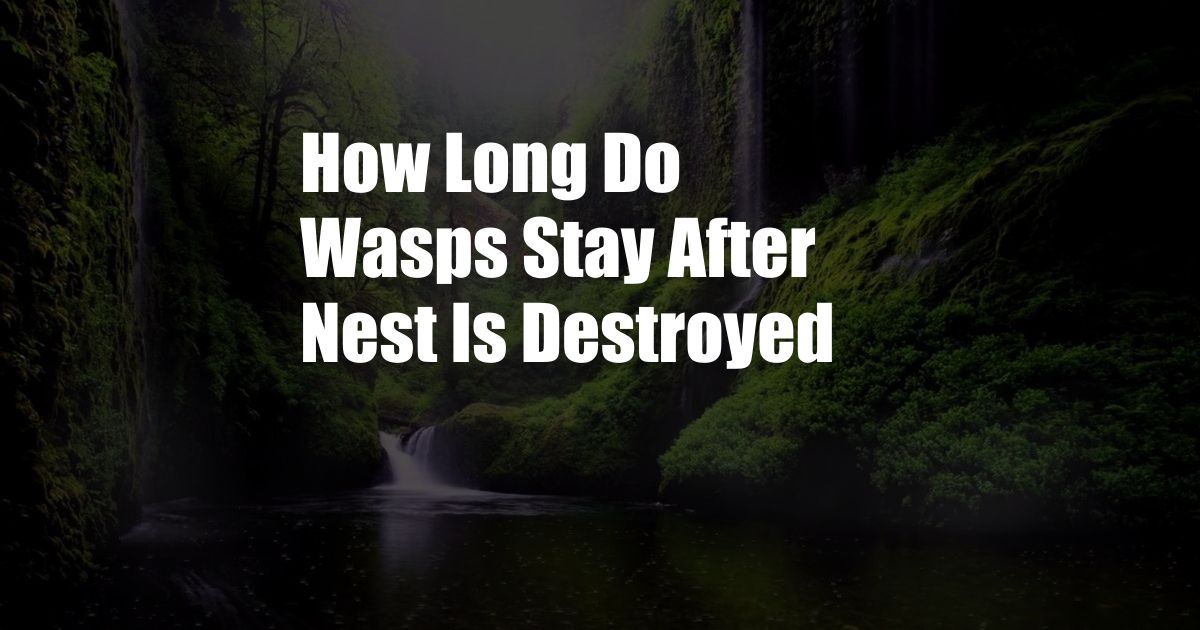
How Long Do Wasps Stay After Nest is Destroyed?
Imagine yourself enjoying a peaceful afternoon in your backyard, when suddenly you encounter a swarm of wasps. Their aggressive buzzing sends shivers down your spine, and you realize that a nest has taken up residence nearby. Panic sets in as you contemplate the danger posed to your family and pets. In such a situation, prompt action is crucial. However, once the nest is destroyed, the question arises: How long do wasps stay after nest is destroyed?
Understanding the behavior of wasps after their nest has been eliminated is paramount for ensuring safety and preventing future infestations. Let’s delve into the intricacies of this topic, exploring the latest insights and providing practical guidance to effectively address this common pest problem.
Dispersal After Nest Destruction
When a wasp nest is destroyed, the colony’s survival instinct kicks in. The surviving wasps, primarily workers and the queen, seek out new shelter to establish a replacement nest. This dispersal typically occurs within a few hours or days after the initial disturbance. However, it’s important to note that some wasps may remain in the vicinity for an extended period, ranging from a few days to several weeks.
The duration of wasp activity after nest destruction depends on several factors, including the species of wasp, the size of the colony, and environmental conditions. For instance, larger wasp colonies tend to disperse more slowly compared to smaller ones. Additionally, favorable weather conditions, such as warm temperatures and abundant food sources, can prolong the presence of wasps in the area.
Potential Hazards and Precautions
While most wasps will move on after their nest is destroyed, there’s always a risk of encountering lingering individuals. These wasps may become disoriented and aggressive, posing a potential threat to humans and animals. To minimize the risk of stings:
- Avoid the area where the nest was located for several days.
- If you encounter a wasp, remain calm and move away slowly.
- If stung, seek medical attention promptly, especially if you experience severe allergic reactions.
Additionally, it’s crucial to thoroughly inspect the area where the nest was situated. Remove any remaining debris or honeycombs to discourage wasps from returning. Sealing up potential entry points, such as cracks and holes in your home’s exterior, can further minimize the likelihood of future infestations.
Tips and Expert Advice
To effectively address wasp infestations and minimize the risk of post-destruction hazards, follow these expert tips:
- Destroy wasp nests during the early morning or late evening when wasps are less active.
- Wear protective clothing, including gloves, long pants, and a beekeeper’s veil.
- Use an effective wasp spray or insecticide specifically designed for nest elimination.
- Avoid using water to extinguish wasp nests, as this can spread the colony and increase the risk of stings.
If you’re dealing with a large or persistent wasp infestation, consider seeking professional pest control services. Trained technicians have the expertise and equipment to safely and effectively eliminate wasp nests, reducing the risk of harm to you, your family, and your pets.
FAQs on Wasp Behavior After Nest Destruction
Q: How long do wasps stay after nest is destroyed if there are no survivors?
A: In the absence of survivors, wasps will typically disperse within a few hours. However, if the nest contained a large number of wasps, some individuals may remain in the vicinity for a few days.
Q: What should I do if I find a wasp nest?
A: If you discover a wasp nest on your property, it’s advisable to contact a professional pest control company for safe and effective removal. Attempting to remove the nest yourself can be dangerous, especially if you’re allergic to wasp stings.
Q: Are wasps more aggressive after their nest is destroyed?
A: Yes, wasps can become more aggressive and defensive after their nest is disturbed or destroyed. It’s important to exercise caution and avoid approaching the area where the nest was located.
Conclusion
Understanding how long wasps stay after nest is destroyed is crucial for minimizing the risk of stings and preventing future infestations. By following the expert tips and advice outlined in this article, you can effectively address wasp problems and ensure a safe and pest-free environment for your family and pets.
If you have any further questions or concerns about wasps or their behavior, don’t hesitate to reach out to a reputable pest control professional for guidance and assistance. Together, we can create a wasp-free haven for our homes and communities.